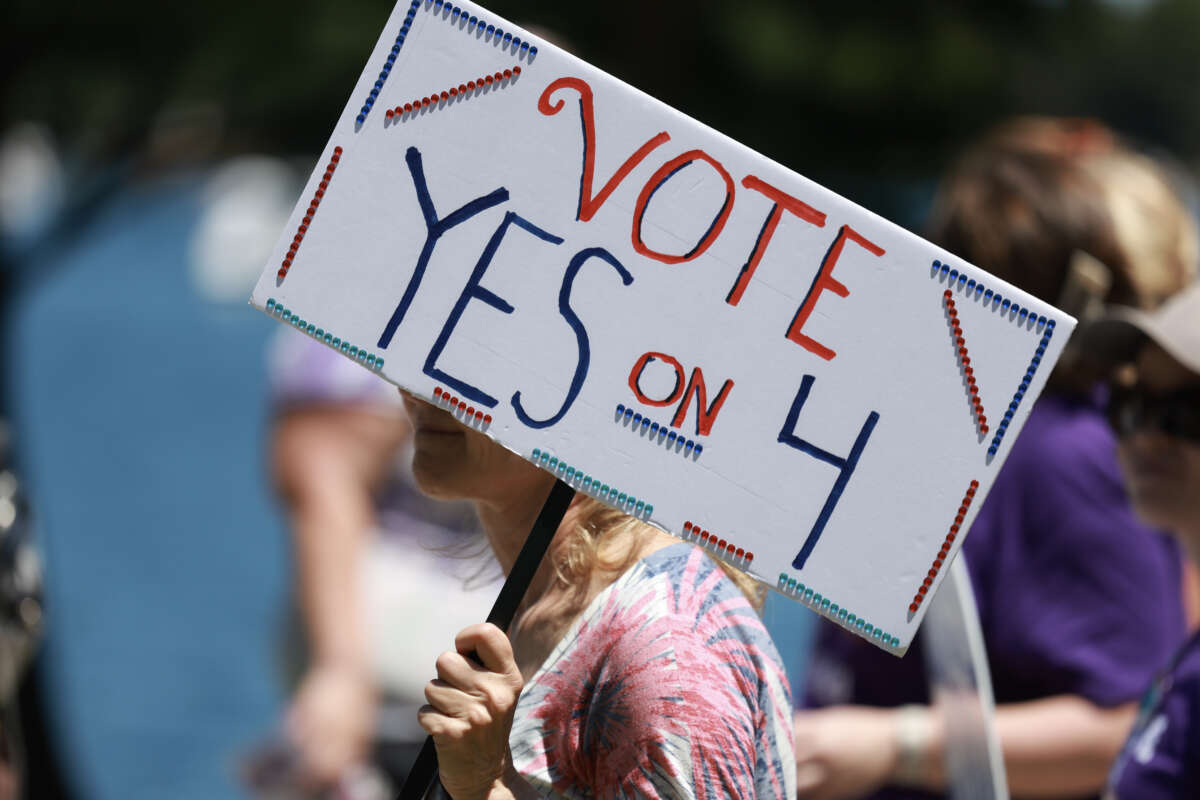Did you know that Truthout is a nonprofit and independently funded by readers like you? If you value what we do, please support our work with a donation.
Supporters of a Florida ballot measure that would outlaw pre-viability abortion bans kicked off the “Yes on 4” campaign in Orlando on Saturday, after the state Supreme Court ruled earlier this month that the proposed amendment can be considered in November.
Abortion care patients, their partners, healthcare providers, and pro-choice politicians were among those who gathered in Lake Eola Park to express support for the proposed amendment to the Florida Constitution.
The Orlando Sentinel reported that Danielle Tallafuss spoke through tears about her decision to get an abortion in 2020 after a scan at around 20 weeks revealed a heart defect that would require multiple surgeries before age 2, if the child, whom she named Nathaniel, even lived that long.
“It was a decision we made out of love, compassion, and doing what was best not just for the son we already had at home, but for Nathaniel, who would have had to suffer through treatments that most adults wouldn’t be able to handle before he could even take his first steps,” Tallafuss said.
According to Reuters:
Derick Cook, a Florida resident, described how his wife finally got pregnant after multiple miscarriages. But a complication at 16 weeks meant her fetus would not survive and threatened her life. Florida had enacted a 15-week abortion limit a few weeks before.
“The doctor told us that because of the ban, there was nothing he could do to help,” Cook said, even though the law allows abortions when the mother’s life is at risk.
Cook’s wife, Anya, delivered the fetus in a hair salon the next day and nearly died at the hospital from blood loss, he said.
On the same day that Florida’s right-wing Supreme Court greenlighted the ballot measure earlier this month it also upheld the state’s 15-week abortion ban — and effectively approved a more recent law banning most abortions after six weeks, before many people even know they are pregnant. The stricter policy is set to take effect May 1.
The court’s early-April decision to let Floridians weigh in on abortion rights “underscores the crucial role of Florida’s ballot initiative process, which provides voters an important opportunity to take the reins when politicians aren’t representing our interests,” Yes on 4 campaign director Lauren Brenzel said earlier this month.
“Polls have consistently shown well over 60% of Florida voters support limiting government intrusion in the personal healthcare decision of accessing abortion care,” she pointed out. Notably, the measure needs that percent of support to pass.
“The fact is, we can never know what someone else is going through — we’re not in their shoes. That’s why we must vote ‘yes’ on this amendment: to keep government out of our exam rooms and make sure Florida families and the doctors who treat them can make the decisions that are right for them,” she added.
As Dr. Marian Sampson, an OB-GYN with Planned Parenthood of Southwest and Central Florida, told the Sentinel, “Trust me when I say there is no medical reason for abortion bans and there is no medical reason for the government to be forcing their way into our exam rooms and standing between me and my patients.”
Florida Gov. Ron DeSantis, a failed Republican presidential candidate, signed both the 15- and six-week bans. He was unable to run a primary campaign that could compete with former President Donald Trump, the presumptive GOP candidate to face President Joe Biden in November.
Trump kicked off this week by highlighting his role in reversing Roe v. Wade — appointing three right-wing U.S. Supreme Court justices willing to erase nearly half a century of abortion rights — and endorsing state-level ban efforts over a federal prohibition. He then said Friday that a nationwide policy is long longer needed “because we broke Roe v. Wade.”
Biden, meanwhile, has faced some criticism for comments on abortion, but his reelection campaign has also emphasized his support for reproductive freedom, sometimes using statements from First Lady Jill Biden and Vice President Kamala Harris.
“Donald Trump is the architect of this healthcare crisis. And that is not a fact by the way that he hides. In fact, he brags about it,” Harris said Friday. “Here’s what a second Trump term looks like. More bans, more suffering, and less freedom. Just like he did in Arizona, he basically wants to take America back to the 1800s. But we are not going to let that happen.”
Speaking against the authoritarian crackdown
In the midst of a nationwide attack on civil liberties, Truthout urgently needs your help.
Journalism is a critical tool in the fight against Trump and his extremist agenda. The right wing knows this — that’s why they’ve taken over many legacy media publications.
But we won’t let truth be replaced by propaganda. As the Trump administration works to silence dissent, please support nonprofit independent journalism. Truthout is almost entirely funded by individual giving, so a one-time or monthly donation goes a long way. Click below to sustain our work.
